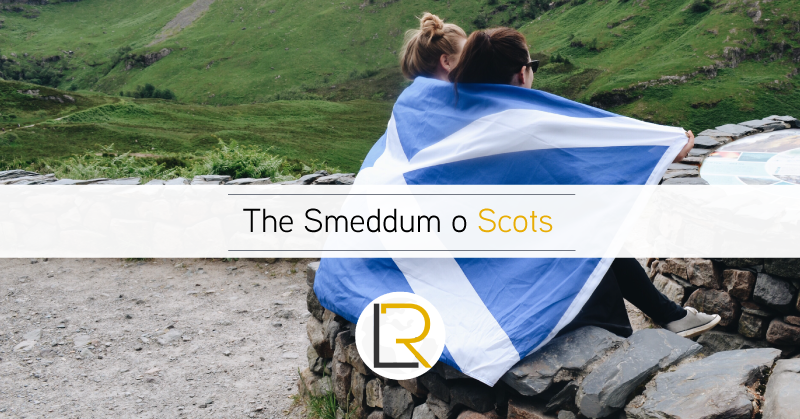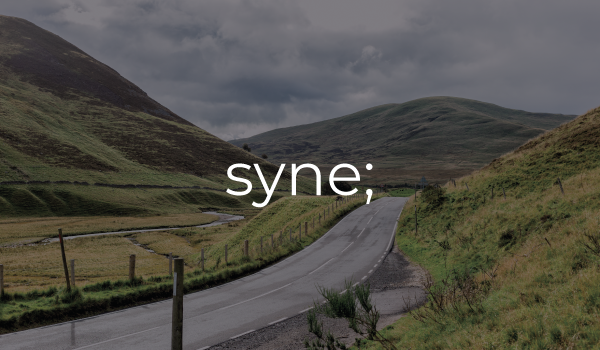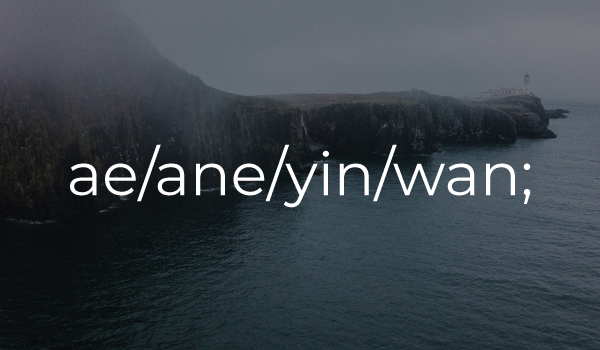Today, Translation Services 24 are fortunate to welcome a guest article written in Scots by Ashley Douglas. Ashley is an Edinburgh-based researcher, writer, and translator working in Scots, Gaelic, Danish, and German. She specialises in Scots original research, writing, translation, style guide and glossary development as well as talks & consultancy. Her areas of special interest include Scottish history and archaeology, politics, linguistics, queer history and culture.
This article is written in Scots – You can find the English version here.

You can follow Ashley on her on Twitter or by visiting her website here. Enjoy!
The Smeddum o Scots
Scots is the Germanic leid spak in Scotland. It is closely relatit tae English – baith developed fae the ae Anglo-Saxon ancestor leid – as weel as tae ither West Germanic leids, sic as German and Dutch, forby the North Germanic leids o Danish, Swedish and Norwegian.
Thirlt tae Scotland’s history and encoonters as a nation, the Scots leid has a guid hantle o influence fae Auld Norse, Gaelic, French, and Latin, amang ithers, forby.
Despite their kenable kinship, Scots and English are – like Swedish and Danish – ultimately sindry leids, wi their ain unique vocabulary, syntax and smeddum.
Whit follaes is a wee owersicht o ten o the maist fykie lexical and syntactical exemples o whit maks Scots, Scots.
-
syne
Monie fowk will ken this wird fae thon maist faur-stravaigit o Scots sangs that is ‘Auld Lang Syne’ – a sang that belangs as muckle tae the warld as it does tae Scotland.
The main sense o ‘syne’ in modern Scots corresponds tae the English ‘ago’, in temporal phrases. An exemple sentence micht be sowt like:
She wis in Denmark twa year syne
Tak tent here forby o the Scots grammatical feature o a singular noon (year) efter a plural numeral. The Danish, fur Nordic comparison, wid be ‘to år siden’ – which kythes faur closer tae the Scots nor does the English (‘siden’ shares etymological roots wi ‘syne’).
Scots: twa year syne
Danish: to år siden
English: two years ago
‘Syne’ can be yaised forby tae mean ‘since’ – in baith the temporal/subsequential sense and the causative/consequential sense. Takkin intae accoont context and register, the former wid maist likely owerset intae English as ‘then’, ‘from’ ‘since’, ‘subsequently’ etc.; the latter, on the ither haun, as ‘therefore’, ‘then’, ‘so’, ‘hence’, ‘accordingly’, ’consequently’ etc. The twa exemple sentences ablow set oot the sindry senses:
- We were in Aiberdeen, syne we gaed back tae Embra
[We were in Aberdeen, then we went back to Edinburgh]
- There wis naewhaur tae bide ower in Aiberdeen, syne we gaed back tae Embra
[There was nowhere to stay over in Aberdeen, so we went back to Edinburgh]
In temporal terms, ye micht see it forby as ‘aforesyne’ (before) and, historically, ‘sinsyne’ (‘since that time, from then onwards’) – although the latter isnae as muckle tae be seen in modern Scots yaisage.
-
ae/ane/yin/wan
Scots has monie wirds fur tae express the English ‘one’. The fower main anes are ‘ae’, ‘ane’, ‘yin’ and ‘wan’. There are, forby, kenspeckle dialectal variants: sic as ‘een’, in the north-east Scots dialect o Doric.
On the ae haun, this maks owersettin fae Scots tae English gey easy. Regairdless the Scots, in English, jist mak it ‘one’. Owersettin fae English intae Scots, on the ither haun, is a bit mair fykie. Bidin wi jist the fower main options, these can be unnerstuid in terms o a scale o flittin formality fae ‘ae’ doon tae ‘wan’.
ae: the maist formal o aw. There’s a guid literary and poetic air tae it (think “Ae Fond Kiss” by Robert Burns) forby a wee bit auld-farrant romanticism.
It is yaised, tae, in modern Scots in a closely-relatit sense, whaur it means ‘the same’. (Readers micht hae taen tent that A’ve yaised it in thon sense twa-three times in this airticle awready.)
It is o muckle interest, forby, tae note that Gaelic – Scotland’s Celtic leid – yaises ‘aon’ in the ae twafauld wey / air an aon dòigh dà-fhillte / in the same twofold way – tae mean baith ‘one’ and ‘the same’. Anither guid exemple o thon lexical affinity atween Gaelic and Scots is at the ae time / aig an aon àm / at the same (i.e. not one) time.
ane: the maist neutral modern Scots; guid fur informal forby mair formal registers. (It’s the ane A yaise oot-through the Scots version o this airticle.)
The west-coast o Scotland wird fur ‘child’ is ‘wean’: at hert, a contraction o ‘wee ane’.
(Tak tent that, ootwi the west coast, the Scots wird fur ‘child’ is ‘bairn’ – anither braw exemple o the Norse influence in Scots, wi kenable cognates in modern Danish (barn), Swedish (barn) and Norwegian (barn).)
yin: this ane’s a bit mair colloquial, but aye neutral eneuch. A productive morpheme and aft the maist naitural in compoonds (e.g. high heid yins, wee yin, auld yin, sair yin, etc.).
wan: maist colloquial o aw, and wi a strang central belt/Glesgae/urban bias. Fur exemple, whan fowk in Glesgae arenae ready fur a gig tae be ower, ye’ll hear chants o ‘wan mair tune’. Like ‘yin’, ‘wan’ is productive in compoonds, and the twa are aft, although no aye, interflittable (e.g. ‘sair wan’ and ‘sair yin’ are equally valid and equally likely tae be heard).
-
forby
A gey flittable item o syntax meanin ‘in addition’, ‘moreover’, ‘besides’, ‘also’, ‘as well as’, etc. It can be yaised at the verra stert o a Scots sentence, at the verra end, or jist aboot oniewhaur in atween, dependin on context and the parteecular sense bein pit across. It’s a haurd ane tae teach, and richt idiomatic yaisage demands a deep and nearhaun intuitive unnerstaunin o the leid.
Readers o the Scots version o this airticle will nae doot hae taen tent o monie an instance o it oot-through, in sindry syntatical positions, e.g:
Forby, it has cognates in the modern Scandinavian leids […]
Tak tent here forby […]
‘Aye’ is gey productive in collocations and compoond wirds forby.
(Fur the sake o haleness, tak tent that ‘forby’ can be also yaised tae mean ‘except’ /‘wi the exception o’.)
-
aye
The maist kenable owersettin o this Scots wird is, o coorse, simply as ‘yes’.
Hooivver, the ae three letters in Scots also mean ‘always’ or ‘still’. As aye in owersettin, context is key fur tae tell ye which ane tae yaise in owersettin. Ither contexts, hooivver, micht demand a mair idiomatic owersettin nor either o thae twa options.
Fur exemple, the phrase ‘fur aye and on’ best owersets intae English as ‘forever and always’ (as opposed tae the mair literal: ‘for always and on’).
‘Aye’ is gey productive in collocations and compoond wirds forby. Ye micht ding doon an ‘aye-been’ mentality or attitude, fur exemple. Syne there’s braw Scots wirds sic as ‘aye-bidin’; literally, ‘always staying’, but generally best owerset intae English as ‘enduring’, ’surviving’ or ‘remaining’.
Forby, ‘Yours aye’ is a guid professional and sincere sign-aff fur letters or emails whan scrievin in modern Scots.
-
scunnert
An adjective whase meanin is gey trauchlesome tae capture in fou in jist ane English wird. Onie owersettin will aye be context dependent – and, ultimately, o shooglie quality. Tae be ‘scunnert’ is tae be forfochen, disjaskit, feenisht, duin; maistly in the emotional sense, although ye can be physically scunnert as weel. In its least intense sense, it covers bein ‘disappyntit by’ or ‘annoyed at’ sowt or somebodie.
Syne, in English, ye micht owerset it variously as ‘disappointed/annoyed’ or, at the mair extreme end o the spectrum, as ‘(emotionally) exhausted’, ‘depleted’, ‘fed up’, ‘done’, ‘finished’. Hooivver, nane o these on their ain cairry oniewhaur the depths or sindry dimensions o ‘scunnert’.
Tak tent that ye micht weel see it scrievit ‘scunnered’, wi the Anglicised ‘-ed’ endin. Hooivver, adjectives and verb endins in ‘-t’ (or ‘-it’) are the mair authentic Scots, baith historically (reflectin hoo Scots has fur the maist pairt been scrievit and spak ower the centuries) and grammatically (fur grammatical coherence and consistency in modern Scots). Here, Scots is siblike tae ither Germanic leids, sic as Danish and German, which also hae suffixes in ‘-t’. (e.g. German: erschöpft (exhausted)).
The verb ‘tae scunner’, alang with the relatit noons (‘scunner’ and ‘scunneration’) and adverb (‘scunnersome’) stravaig e’en mair widely semantically, and wid weel tak up a hale airticle aw on their ain. Scrievit yaisage can be traced back as faur as the 1300s; it kythes in the 14th-century epic The Brus, the earliest mensefu wark o Scots literature that has cam doon tae us.
-
A seen / A done / A’ve went
Scots has a gey flexible approach tae preterites (simple/ae-verb past) and past participles (complex/compoond/twa-verb past), which are are yaised mair or less interchyngably.
It is mair nor fine tae sey in Scots, ‘A seen’, ‘A done’, or ‘A’ve went’ (c.f. English ‘I saw’ (v.s. ‘I have seen’); ‘I did’ (v.s. ‘I have done’) or ‘I went’ (v.s. ‘I have gone).
Syne, chyngin ‘A seen’ tae ‘I saw’ or ‘A done’ tae ‘I did’ isnae richtin bad English tae guid English, but owersettin acceptable staunart Scots intae acceptable staunart English.
-
tae thole
This verb covers sae muckle grund in Scots that it jouks onie satisfactory owersettin intae English. Maist o the time, it is best owerset as ‘to tolerate’ or ‘to endure’. Hooivver, the semantic field o the Scots verb is faur mair intense, rich, and deep. It encompasses forby a profoond sense o mensefu silence and patience in sair-wechtit dule, o moral and spiritual stoicism and fortitude.
In thon sense, it is thirlt tae a faur mair michtie sense o hert-hirplin sufferin, sic that ‘to bear’ or ‘to suffer’ micht whiles offer the better owersettin intae English. Ye micht thole (tolerate) a bodie that’s daein yer heid in, but, in Scots, ye can also thole deep dule or hertbrek in a wey that ye widnae jist ‘tolerate’ but ‘endure’ or ‘suffer’ siclike in English.
Like ‘scunnert’, it is attestit tae in scrievit Scots fae as early as the 1300s, and kythes in The Brus. Forby, it has cognates in the modern Scandinavian leids: Danish ‘at tåle’; Norwegian ‘at tåle’; Swedish ‘att tåla’. The michtie Norse element in Scots – and syne the ayebidin muckle affinity atween Scots and its northern neebour tongues – is a frequent featur distinguishin Scots fae its sister leid o English the day.
Thaim that tholes, owercomes
An English owersettin o the auld Scots saw abuin wid aiblins be:
Those who endure, overcome/prevail
Here, we hae no jist the verb “tae thole” – a fair hantle o whase meanin we maun but tyne in the flit tae “endure” – but a wheen featurs o distinct Scots grammar forby: fae the singular verb endins in -s efter a plural subjeck, tae the objeck form o the pronoon ‘thaim’ in subjeck position (c.f. English ‘those’) and the yaise o ‘that’ as a relative pronoon, includin fur people (c.f. English ‘who’).
-
A doot
This is a gey unco ane, in that ye can owerset it wird-fur-wird intae English nae bother (‘I doubt’) – but tyne the meanin entirely. It’s siccarly ane o the maist fykie featurs o Scots tae explain, fur stertin a sentence wi ‘A doot’ can mean either ‘I highly doubt that’, ’I am certain that’, or – somewhaur in the middle – ‘I guess/suppose that’.
‘A doot thon’ll happen’ can syne mean either, ’A’ve nae doot thon’ll happen’ or, ’There’s nae chance thon’ll happen’. In the ae wey, ‘A doot they’ll be back’ could mean either ‘They’ll be back fur siccar’ or ‘They’re nivver comin back’.
A doot that a bodie’s anely freen in kennin whit wey tae owerset it is a context informit educatit guess.
-
high heid yins
literal terms, the Scots reads ‘high-head-one’. On the surface o it, it means ‘a person in authority’, ‘a leader’, ‘an official’, ‘a boss’. In the plural, it braidens oot tae cover the notion o ‘the management’ or ‘the authorities’.
Hooivver, ablow its apparent neutrality, this Scots term is stappit fou o sleekit irreverence – sae sleekit ye can jist aboot get awa wi it, but awbodie kens it’s there. It is kenably mair nor the sum o its innocent-kythin three pairts: there’s a muckle warld o connotit difference atween the “First Minister o Scotland” and the “high-heid-yin in chief”.
In the plural, ‘high-heid-yins’ micht whiles alloo itsel tae be owerset intae English as ‘the powers that be’, which has thon ae implied sense o begrudgin acceptance o the pooer o the pooer-hauders in question. Hooivver, thon term – alang wi, fur exemple, ‘the big wigs’ – is faur mair shooglie nor ‘high heid yins’ in terms o propriety. The Scots term sits richt on the cusp atween formality and informality, and is frequently heard in formal settins, sic as in the Scots Pairlament and in the media.
It’s o interest tae tak tent, forby, that ‘high heid yin(s)’ kythes as ane that non-Scots speikers in Scotland will tak intae their vocabulary, but scrieve and pronoonce in weys that mynts that they dinnae fur necessar fully unnerstaun the unnerlyin three wirds (especially the mair Scots final twa), but raither ken the combination o soonds and whit it means as a hale. A’ve seen reference, fae non-Scots speikers, tae a ‘high heejun’ or ‘high heejunz’ fur exemple.
This minds on the Anglicisation (or Scotticisation) o Gaelic wirds in Scotland. Gin ye dinnae ken the Gaelic, ye jist hear a combination o soonds that ye syne mell thegither intae ane unit; gin ye ken the individual wirds, hooivver ye can aye hear the root wirds unnerneath. Fur exemple, the adjective ‘smashing’ is maist likely tae be fae the Gaelic ‘is math sin’ (is good that’). Scottish place names are anither ‘smashin’ exemple o this phenomenon; e.g. Drumnadrochit, which means, in Gaelic “Druim na Drochaid – the ridge of the bridge’.
-
outwith/ootwi
O coorse, nae discussion o uniquely Scottish terms wid be complete wioot reference tae the patriot’s preposition that is ‘outwith’ (or ‘ootwi’ – mair ablow), meanin ‘ootside o’ or ‘ayont’.
This is a sae-cawed ‘covert Scotticism’, in that maist o its yaisers dinnae e’en ken it’s a Scotland-specific wird until spellcheck skelps it wi a squiggly wee reid line, transformin e’en the maist unsuspectin intae dae-or-dee defenders o Scottish syntax.
The mair tentie readers micht hae noticed that A scrievit ‘Scottish’ and ‘Scotland-specific’in the abuin, joukin reference tae ‘Scots’. This wis duin gey consciously – fur ‘outwith’ bides strangly in the sphere o Scottish Staunart English (the variant o English spak in Scotland) as opposed tae bein pairt o the modern Scots language proper, whaur it wid be ‘ootwi’, biggit fae the twa Scots prepositions ‘oot’ and ‘wi’.












